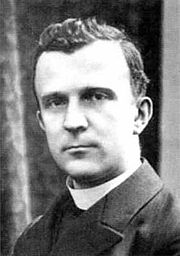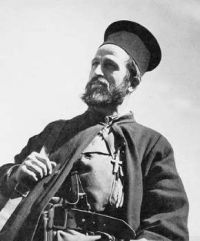Birth of a martyr priest.
August Froehlich (1891-1942) was born into a well-to-do Prussian family and as a young man served with distinction in the German army during World War I, being wounded on both the Eastern and the Western Fronts and winning the Iron Cross. After the war he studied for the Roman Catholic priesthood and was ordained in 1921. During the economic crisis during the Weimar Republic he used his own finances to support the poor. When the Nazis came into power in 1933 he made his opposition to them public, refusing to use the “Heil Hitler” greeting. After the beginning of the Second World War Froehlich ministered to Catholic Polish slave labourers who were imported to Germany. His defence of them when they were abused led to his arrest. He ended his days in the “priest barracks” of Dachau concentration camp where the Nazis would hold over 2,700 clerics, dying of mistreatment in 1942.
Birth of a warrior priest.
Dimitrios Holevas (1907-2001) was a priest of the Greek Orthodox Church. He originally studied archaeology and literature but in his 30s he was ordained into the clergy. When Germany invaded Greece during World War II, he went underground and joined ELAS, the Greek People’s Liberation Army. He became famous as Papa-Holevas (“Father Holevas”), organizing his fellow priests to support the resistance and taking part in military actions himself. He was elected a delegate to the left-wing war-time parliament. At the end of the hostilities with Germany, a civil war broke out in Greece between ELAS, dominated by Communists, and right-wing forces supported by Britain and the United States. Finding himself on the losing side, Holevas was suspended from his clerical functions for three years. He was later rehabilitated and lived to a ripe old age, decorated by the Greek Church.

